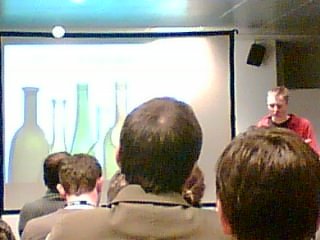Trust
The xp.be user group meeting was hosted by the Javapolis conference, at the Metropolis cinema complex. The subject was “Trust”. Not about one of my favourite movies, but about “Building a high trust culture in your software engineering organisation”. Trust is hot. Lots of business books about trust have come out these past two years.
David Anderson gave a packed room an interesting and useful talk. As one might expect from a creative company providing images, the presentation consisted of large, gorgeous pictures with simple captions. David is an accomplished and relaxed speaker. He enlivens the presentation with humour, stories and anecdotes.

What’s trust got to do with software engineering or business? The Trust Dividend is the elimination of bureaucracy, reduction of transaction costs and elimination of waste. Things just flow; things just work.
Trust is a chemical
What is trust? Trust, is amongst others, the presence of high levels of Oxytocin in the brain. Oxytocin has other effects too.
Trusting does not mean liking. It means that you’re willing to deal with each other without costly command and control, audits, written contracts. A handshake is good enough. We know that we’re true to our word.
So, how do you get/build trust?
A few tips:
- Trust begets trust
- Be humble and respect the other
- Vulnerability disarms
- Apologize for poor results; take responsibility, even if you weren’t involved in the delivery of the poor results; promise better; deliver.
- Keep delivering, regularly, predictably.
- Deliver daily on your personal commitments; deliver daily or weekly on team commitments
- Demonstrate competence; rehearse and practice for perfect delivery
- Be transparent
- Encourage learning from failure
- Get rid of command & control
- Build up a reputation
- Define clear values and principles; let them guide decision making
How does trust between organisations or teams work? Trust is held in the individuals you interact with. So, be careful with turnover. Everyone who leaves takes the trust invested in them away with them. High turnover reduces the trust.
David illustrated the different levels of trust by the way the planning for releases evolved:
- At first, the different participants in the planning meeting bargained: “Department X gets to choose stories for 20% of the budget; department Y gets to choose stories for 15% of the budget;…“
- As trust increased, a sort of democratic process evolved: story elections were held, people lobbied,…
- With increasing trust, planning was done collaboratively, by consensus. Stories were chosen for the good of the whole company, not any individual department.
After a reorganisation, other people came to the planning meeting. The trust level dropped. Planning went back from consensus to democracy. It will take time for trust to be rebuilt.
What do I do tomorrow?
Do you want to work better, faster and get more satisfaction out of it? Increase the trust level in your team. Implement one of the tips tomorrow. Just do it. Invest some trust.
Make work like a game and have fun!
David will present this talk in Scotland on December 17th. Be there if you’re in the neighbourhood. Recommended!
A big thank you to David for combating jetlag by giving an extra presentation in the evening. I hope the Belgian beers helped to get asleep afterwards.
Good definition of trust and the 12 simple tips for building trust are great. Thanks for sharing!
The January Carnival of Trust…
As someone who writes and thinks a lot about selling, I’m well aware that where there has been a sale there surely has been trust first.
I’m honored to be hosting the January 2008 Carnival of Trust. The Carnival of Trust is a monthly blog …
Just a comment–Collaboration and consensus are good to build trust but often produce results that are watered down compromises while seeking to satisfy all stakeholders’ interests in the discussions. That is the flip side of consensus management and has to be watched out for in the overall management process of the company. Getting agreement and getting consensus are two different things–with fine points of distinction.
For example, I might agree to go along with something I was not enamored with but only because I TRUST you. You don’t have my consensus–you have my agreement to trust in your decisionmaking on this issue.